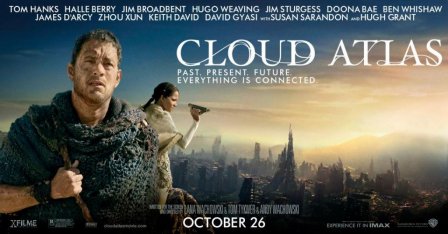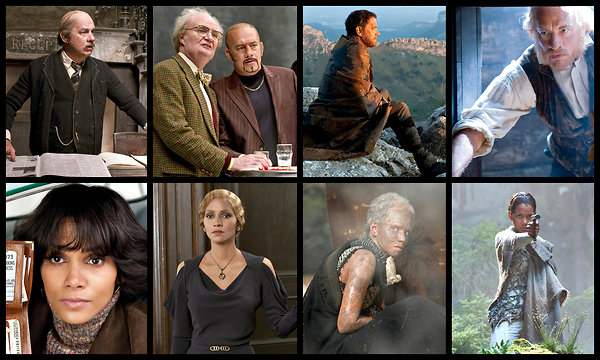Birthing our Future:
Cloud Atlas
(2012)
“A half-finished book is, after all, a half-finished love affair.”

Well, yes. I’m a little late putting this review up. I had originally intended to see it on the big screen; but it seemed to be released and gone again before I ever made it. So: without even checking I’m guessing it hasn’t made much money. Then a month ago I thought that I’d watch it in the early evening and have a review up before I hit the sack. How naive was that?
I pity any reviewer with a deadline who had to see this and have his opinion immortalised the following day; because if ever a film demands to be seen more than once it is Cloud Atlas. I remember an acquaintance saying to me many years back that great Art is rarely comprehended in one reading, viewing or listening. And sure, that may not have been original to the person in question and certainly sounds more than a little pretentious, but it also tends to be true.
Certainly, watching Cloud Atlas the first time, I was more than a little thrown: half-an-hour into it I was not getting the concept at all. It seemed to be jumping around the place far too much and I was really getting put off by the make-up of the characters. Apart from finding some of the make-up jobs seriously dodgy (some of those noses rival Nixon’s in Watchmen) I was distracted by trying to see who was playing who, as most of the actors– major and secondary parts alike–play multiple characters.
Then something happened: it suddenly seemed that the make-up jobs didn’t matter in the slightest and I completely ‘connected’ with the film. Before it was over I knew that I was watching something quite remarkable and that I would have to see it again. I hadn’t checked the running time beforehand and when I realised that the film had clocked in at three hours long I was astonished. It certainly didn’t seem that so much time had passed.
___________________
“While my extensive experience as an editor has led me to a disdain for flashbacks, flash forwards and all such crazy gimmicks, I believe that if you, reader, can extend your patience for just a moment, you’ll find there is a method to this tale of madness.”
And just as this character justifies his story telling technique at the beginning of the movie, so do the film’s directors/writers give fair warning that the ride we are in for is one that will not be told in linear fashion but will instead be in—yes—flashbacks, flash forwards and such crazy gimmicks.
Except that this style soon becomes anything but distracting. Instead, the film makers brilliantly edit furiously until dialogue occasionally crosses Time itself and the story is seemingly spurred forward by the events of the past or the future. And the very rhythm of the film becomes irresistible.
There are six period settings for the action, ranging from the South Pacific Islands in 1849 through Cambridge, 1936 and San Francisco in 1973; and from London in 2012 through Neo Seoul in 2144 and on to a period which is set, we are told, ‘106 Years After the Fall.’ We get a pre-title overview of these settings. Then, following the title we go through them in chronological order for perhaps thirty minutes; and thereafter we are shown scenes seemingly at random. And I say seemingly because your enjoyment will be enhanced if you stop trying to think intellectually about what you are seeing and simply go with this centuries-spanning tale. And on the way you’ll be rewarded with tragedy, comedy, good science fiction and mystery stories, not to mention quite a lot of things to think about after the movie has ended.
The characters turn up time and again under vastly different guises and in vastly different periods. Or, as one puts it:
“This world spins from the same unseen forces that twist our hearts…we cross and re-cross our tracks like figure skaters.”
A rather beautiful image for a sensation that I’m sure we’ve all felt at times.
Right from the 1849 story up until the futuristic events, one of the big themes of Cloud Atlas is that of Humanity’s persistent attempts to keep some people as a slave class. In fact the sections in the Pacific, with the lawyer Adam Ewing conducting business that will further his father-in-law’s interests in the slave trade, make the viewer think far harder about the sheer immorality of it than anything in Steven Spielberg’s tedious Lincoln ever could. And almost 300 years after Adam Ewing and his wife have decided to join the Abolitionists in their fight against slavery we are intercutting with the tale of Sonmi-451, a woman who has been genetically created as a clone/slave. Yet now, being awakened in her thinking, is leading a rebellion against her masters.

And some centuries after that Sonmi is worshiped as a Goddess in The Valley, where primitive tribes who have survived an unspecified Fall are studied by a group of equally dead-ended scientists known as Prescients.
Cloud Atlas is a great big ambitious epic of a movie; and if it doesn’t always work then it still remains something to be admired at a time when Hollywood seems mainly interested in recycling the same material over and over.
It would seem to suggest that acts of kindness will reverberate down through the generations; and supposedly, by inference, acts of cruelty also. As Sonmi puts it:
“Our lives are not our own. From womb to tomb we are bound to others, past and present. And by each crime and every kindness we birth our future.”
(Actually, you may recall a similar sentiment in Ridley Scott’s Gladiator.)
Now, that hits me as rather beautiful; but I find it much harder to see the theme of reincarnation holding together. Apparently the Wachowskis (more on them in a minute) really pushed for lead actor Tom Hanks to imagine that he was portraying one soul going through multiple incarnations. According to Hanks, he wasn’t buying it, mainly because he didn’t believe it; and I have to say that I agree with him here.
This seems to be why the directors went with the idea of having their principles play so many different characters. But if that is the case then why is Hugo Weaving, in one of his many roles, cast as Old Georgie, a fictional Baron Samedi-like God that Zachary of The Valley persistently hallucinates?
[Just as an aside: did anyone else feel that the presence of Weaving, along with his distinctive intonation, give certain scenes the feel of a companion piece to the great V for Vendetta, also scripted by the Wachowskis?]And why does Zachary have a moment when shock sends a series of images from the other times and lives to him—and yet in at least one of those images his ‘soul’ wasn’t even present?
No doubt these and many more points will be argued about by the film’s supporters as well as its detractors—and there are plenty of both. In that aforementioned scene I was tempted to hit the freeze frame several times…but no. I think that I want this film to retain a lot of its mystery. Also, I think that would have interfered with the gorgeous rhythm that I mentioned previously. I’m not really sure that I want it explained completely. And in fact, once you get the hang of it—reincarnation aside—it’s all a lot simpler than it at first appears.
Lana Wachowski
The cast of Cloud Atlas are terrific: amongst others we have– along with Hanks and Weaving– Halle Berry, Jim Broadbent, Jim Sturgess, Doona Bae, Ben Wishaw, James D’Arcy, Hugh Grant and Susan Sarandon. All enter into the spirit of things with the multiple roles and with varying degrees of success. I was happy to suspend belief in most cases, so much was I enjoying the experience. But there was one example where that was really difficult: as much as I like Hugh Grant (yes, I am that fan!) in general and here in particular, I just could not bloody accept him as a tattooed barbarian. That really was a step too far.
The film has three directors, who also produce and write the screenplay (based on the novel by David Mitchell): the order that they are given is Lana Wachowski, Tom Tykwer and Andy Wachowski. Tykwer does 1936, 1973 and 2012 whilst Lara and Andy take care of 1849 and the futuristic segments.
Everyone seems to know Tykwer from Run Lola Run of some years back. I’ve lost touch with what he has done of late but do recall being knocked out, also some years back, by a terrific film he made called Winter Sleepers. In fact, just thinking of it makes me want to see it again.
The Wachowski Brothers, as they were then, hit the ground running with the brilliant Bound before briefly taking over the world with The Matrix. Since then their star has dimmed a little, which is one of the reasons that they found it so hard to get funding for this. The budget came in at $102 million and they probably could have done with a little more for a film of this stature. Also in the meantime Larry has had a sex change to Lana.
This is something that I don’t believe would normally be in the remit of any reviewer to comment on. Well, unless it was The Catholic Herald or the Muslim Weekly, maybe; and then you wouldn’t be able to stop them for love nor money. It is, quite simply, her own business. Still, given the tone of Cloud Atlas, it is rather hard to avoid. After all, the actors do not just change roles, they change race and gender. And there are those two great lines:
“Each encounter suggests a new direction”; and “All boundaries are conventions, waiting to be transcended.”
This film also comes across as wonderfully humane and a genuine plea for tolerance that doesn’t make you want to gag and reach for the diabetes shots. Yes, I think that it’s fair to say that, sex change or not, I’d be happy in the company of anyone who was involved in this wonderful film. And just as an aside, doesn’t she look a hell of a lot happier now than she ever did as a man? So good luck to her.
The usual suspects turned up crying about the racism of the film. Yeah, it’s that word again that is always wheeled out by anyone who is in short supply of Things to Be Offended By. How, pray tell, is it possible to whine about the racism of having white actors play Asian characters when we also have a black American like Halle Berry playing white characters or Korean actress Doona Bae playing white roles? And Jesus wept; men play women and women play men just like in days of yore! So, again: what is all this rubbish about racism?
Seriously, off with you and find another axe to grind, plonkers!
Cloud Atlas is one of those films that I’m pretty sure will be re-evaluated and explored in years to come when we’ve all grown up a bit. It is moving, visually beautiful and there are some great stories in here as well. And yes, it does have a message and not a bad one at that.
On top of that there is a soundtrack that will still be playing in your head long after the movie is over, provided by long-time collaborators Tom Tykwer, Reinhold Heil and Johnny Klimek.
So what more do you want?
Watch Cloud Atlas with an open mind; and I wish you the riveting experience that I had. Fair enough?
[youtube id=”ByehYal_cCs” width=”600″ height=”350″]


Recent Comments